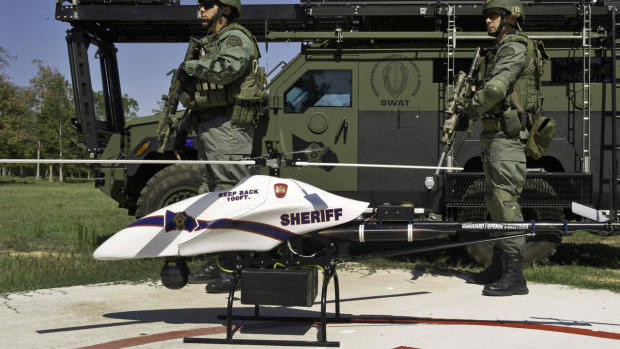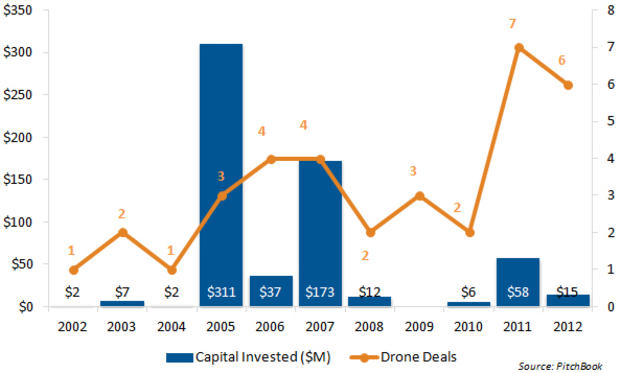Drones: Coming (maybe) soon to skies near you
(MoneyWatch) Commercial interest in the civilian drone market is considerable, and it's easy to see why given the technology's potential for monitoring traffic, keeping an eye on crops, predicting the weather, fighting fires, and surveying damage from storms and other disasters. Such tasks are now typically handled by helicopter, which is costly and occasionally dangerous. The use of unmanned aircraft would seem to offer useful applications in all these instances without a danger to a pilot and passenger.
Yet while this is an industry waiting to take off, until the Federal Aviation Administration sorts out the rules of the air for unmanned vehicles it will remain idling on the runway, because for now commercial flights are banned. Congress has asked the FAA to write regulations governing civil operation of small unmanned aircraft systems in the national airspace by 2015. It's not clear whether the agency will meet that deadline or not.
"There's just too much uncertainty," said Phil Finnegan, director of corporate analysis at the Teal Group, which monitors the aerospace industry. "There will be applications when the FAA opens up the airspace. The first one will be law enforcement, then civilian. But for now, they cannot fly freely in airspace. "
As it deliberates, the FAA is facing important questions. It's easy to imagine some of the problems associated with drone use -- the nation got a small taste earlier this week when a commercial airline pilot saw an unmanned aircraft pass near his plane.
Drones, armed with cameras, conjure visions of privacy invasions by neighbors, police and criminals. They raise property rights issues that courts have not yet sorted out -- old common law notions that a landowner owns the airspace above his land into the heavens. But what limitations are there on drone operators? What limits on frequency of flights and altitude should there be?
Indeed, the FAA has been fretting over privacy as one reason its review has been dragging. By late December, it was supposed to choose six sites in various states where drones would undergo safety and other tests; it said in February that it has started the process for selecting those sites. Meanwhile, the agency has granted more than 1,400 licenses to operate drones to law enforcement agencies, universities and federal agencies. Those permits have caused consternation among civil liberties advocates and others.
The FAA predicts that within five years after it approves its guidelines, 10,000 commercial drones will be in use. Mario Mairena, government relations manager with the Association for Unmanned Vehicle Systems International, a non-profit trade organization, expressed confidence that the commercialization of unmanned vehicle technology will help create jobs and boost economic growth.
"With respect to jobs, we feel the industry will create 34,000 manufacturing jobs and over 70,000 new jobs in the first years after the FAA rules take effect," he said.
So far, despite the uncertainty, there have been significant private investments in commercial drone startups. PitchBook, which monitors venture capital and private equity investments, tallied more than $620 million in such early-stage investments since 2002 (see graph at bottom).
"You have a lot of [venture capital] in the area as investors try to get in early," Finnegan said. "But even as the commercial market develops, the military market will be dominant. The drones are bigger, more complex. The military wants the maximum performance and price is no problem. In the commercial sphere, price is paramount."
The Teal Group estimates that the market for military drones will surge to nearly $90 billion over the next ten years.
Perhaps no company better captures the uncertainty in the commercial space than a startup company called HoverFlow, which bills itself as "New England's premier aerial filming and photography service." The company's two partners laid out about $20,000 of their own money to buy cameras, drones, and various control equipment to make elegantly filmed aerial videos.
They have been making videos, but donating them to clients free of charge. Were they to get paid for their work, it would be deemed commercial. By donating the video, they can fly their craft under rules governing hobbyists -- keeping their craft within the line of sight of the operator, for example. Co-founder Chris Trafford said they're also observing safety precautions that go beyond what might face commercial drone operators once they're given clearance.
"It's legal to fly but we can't charge -- that would make us commercial," Trafford said. "So we're hurrying up and waiting."

